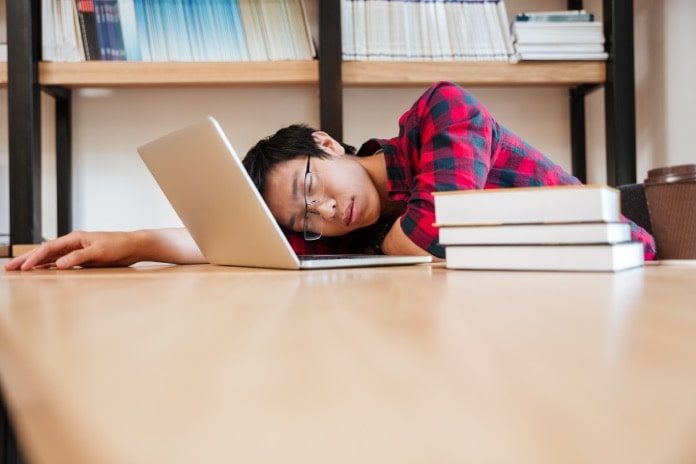Recent studies revealed the benefits that adequate sleep can have on exam preparation and exam day.
Sleep deprivation affects millions of students in high school and college. Many students worry that having eight full hours of sleep will cut into their exam preparation, but they may not be aware that a lack of sleep will restrict their ability to pay attention during their finals.
In a recent collaborative study published in the Journal of Interior Design and the journal Teaching of Psychology, researchers wanted to examine the benefits of having eight hours of sleep on exam preparation and on the exam day. Students tend to cram and pull all-nighters when studying for exams, and they are willing to sacrifice a good night’s rest to make more time to study.
Previous research has shown the importance of having enough sleep and the effects a lack of sleep can have on a student’s overall academic performance. Previous research has also shown that fewer than 10% of students maintain the recommended eight hours per night of sleep or even a minimum of seven hours.
The eight-hour sleep challenge
The study published in the Journal of Interior Design enrolled 27 freshman-level interior design students in a clinical study for five nights, but only 22 students attempted the eight-hour sleep challenge at a private research university. Of the 27 freshmen enrolled in the study, 26 of them completed the Pittsburgh Sleep Quality Index. This sleep index gives an estimate of global sleep quality over the previous month. The study in the journal Teaching of Psychology enrolled 18 students majoring in psychology and neuroscience in a clinical study for five nights, of which 78% were females. Of the 18 students enrolled, only eight students opted to undergo the challenge.
The students majoring in psychology received education about sleep, but the interior design students did not receive any training or education on sleep. Psychology and neuroscience students attended a class twice a week for 75 minutes for lecture and journal article discussion on sleep medicine and sleep research. The students were placed into two groups; one group received extra credit at the end of the study and the other did not.
The students wore a wrist-band sleep monitoring device for five days to monitor their sleep and the number of hours they are awake versus asleep. The students were offered extra credit for averaging eight hours of nighttime sleep without any nights of less than seven hours of sleep. Interior design students enrolled in the eight-hour challenge reduced their time awake by an average of 490 minutes throughout the study compared to those that did not enroll who averaged 413 minutes.
Students with eight hours of sleep outperformed others who did not partake in the challenge
The study found that students who enrolled in the challenge performed nearly identical on their final exam to those who did not enroll. The study also showed that students who had more consistent sleep performed better than those who had a poor sleep pattern. On the other hand, psychology and neuroscience students that successfully completed the challenge outperformed the students who either opted out or did not complete the challenge.
Interior design students enrolled in the challenge increased the percentage of students getting eight- and seven-hour sleep each night by 59% and 86%. Around 71% of the psychology and neuroscience students enrolled in the challenge could average eight hours of sleep. The research shows that students who slept eight or more hours outperformed those who opted out of the challenge.
Several study limitations to consider
There are several limitations to this study. For the psychology students, the researchers did not collect data on the students that opted out of the challenge and assumed they averaged less than eight hours of sleep each night. Another limitation is the study size because the students are enrolled in an upper-level course and the sleep trackers are expensive.
The interior design students experienced several limitations as well. The first is the study is not an experimental study, due to ethical considerations to not randomly assign students to either an extra credit opportunity or not. Another limitation is also the study size, the challenge was limited to only freshmen’s majoring in interior design at one university. The cost of the sleep tracker was also a limitation in the study.
Sleep challenge changed student perspectives on getting eight hours of sleep
After completing the challenge, the students realized that getting enough sleep will not interfere with their time to study, exam preparation, or their exam day. They are now aware that getting eight or more hours of sleep will help them to pay attention during exam time. The goal of this study was to promote and encourage sleep and bring awareness. This study provides several areas for future research on the sleep and exam preparation.
For students currently studying for final exams, here are top 4 stress management tips.
Written by Nicole A. Brown, MS
References:
- Baylor University. (2018). Bonus for superior snoozing: Students who meet 8-hour sleep challenge do better on finals. ScienceDaily. Retrieved from www.sciencedaily.com/releases/2018/12/181203080319.htm
- King, E., Mobley, C. and Scullin, M. K. (2018). The 8‐Hour Challenge: Incentivizing Sleep during End‐of‐Term Assessments. Journal of Interior Design. doi:10.1111/joid.12135
- Scullin, M., (2018). The Eight Hour Sleep Challenge During Final Exams Week. Teaching of Psychology. Retrieved fromhttps://doi.org/10.1177/0098628318816142



